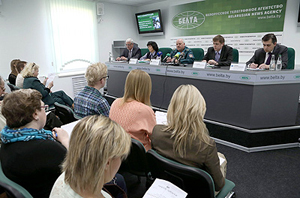Ru
|
Eng
Belarusian nuclear safety watchdog to better cooperate with independent technical support bodies
21.04.2014

Belarus will pay close attention to the further development of the Nuclear and Radiation Safety Department of the Belarusian Emergencies Ministry for the sake of implementing proposals voiced by parties to the Nuclear Safety Convention in Vienna in late March. The proposals were voiced as part of the presentation of the 6th national report on fulfilling the Convention, said First Deputy Emergencies Minister of Belarus Vasily Stepanenko during the press conference in BelTA’s press center on 21 April.
In his words, after the report was presented and the overall positive evaluation of nuclear safety levels in Belarus was given, some challenges for Belarus were formulated. As the main challenge the regulating body will have to properly evaluate the documents submitted to get the license and will have to enable proper oversight over the Belarusian nuclear power plant’s construction process. The Nuclear and Radiation Safety Department is quite a young agency, said the official. The Belarusian nuclear power plant is the first nuclear power plant the agency oversees. A lot has to be done to establish and develop the competence of the regulating body, explained the First Deputy Emergencies Minister.
The Nuclear and Radiation Safety Department also has to improve interaction with independent technical support structures. The key one is the United Energy and Nuclear Research Institute Sosny. This interaction grows more prominent taking into account the need to create an inspection system at the nuclear power plant construction site. “The inspectorate has been created, personnel numbers have been determined, people are being recruited and trained,” said the official. “Personnel training is our most important task on the whole. The demand for competent specialists is high because the number of personnel employed by the Nuclear and Radiation Safety Department was doubled in 2013 alone,” said Vasily Stepanenko.
He said that the personnel numbers and the organization structure of the Nuclear and Radiation Safety Department of the Belarusian Emergencies Ministry will be revised and improved later on to match the construction of the nuclear power plant.
“We will definitely bear in mind all the proposals voiced by parties to the Convention particularly since Belarus is implementing its first nuclear project,” stated the First Deputy Emergencies Minister.
In turn, Olga Lugovskaya, Head of the Nuclear and Radiation Safety Department, noted that the Belarusian agency closely cooperates with colleagues from Ukraine and Russia, who boast considerable experience of oversight in nuclear energy and nuclear safety matters. The Belarusian and Russian agencies signed an agreement on cooperation in the regulation of nuclear and radiation safety matters in late 2013. The agreement is supposed to expand cooperation that began with the creation of the Belarusian agency. Belarusian specialists are offered on-the-job training during inspections of nuclear energy facilities. In February 2014 the first comprehensive training inspection of the Belarusian nuclear power plant construction site took place. The inspection involved Russian consultants and representatives of all the Belarusian ministries and agencies in charge of overseeing the construction of the nuclear power plant and the operation of the facility later on.
In his words, after the report was presented and the overall positive evaluation of nuclear safety levels in Belarus was given, some challenges for Belarus were formulated. As the main challenge the regulating body will have to properly evaluate the documents submitted to get the license and will have to enable proper oversight over the Belarusian nuclear power plant’s construction process. The Nuclear and Radiation Safety Department is quite a young agency, said the official. The Belarusian nuclear power plant is the first nuclear power plant the agency oversees. A lot has to be done to establish and develop the competence of the regulating body, explained the First Deputy Emergencies Minister.
The Nuclear and Radiation Safety Department also has to improve interaction with independent technical support structures. The key one is the United Energy and Nuclear Research Institute Sosny. This interaction grows more prominent taking into account the need to create an inspection system at the nuclear power plant construction site. “The inspectorate has been created, personnel numbers have been determined, people are being recruited and trained,” said the official. “Personnel training is our most important task on the whole. The demand for competent specialists is high because the number of personnel employed by the Nuclear and Radiation Safety Department was doubled in 2013 alone,” said Vasily Stepanenko.
He said that the personnel numbers and the organization structure of the Nuclear and Radiation Safety Department of the Belarusian Emergencies Ministry will be revised and improved later on to match the construction of the nuclear power plant.
“We will definitely bear in mind all the proposals voiced by parties to the Convention particularly since Belarus is implementing its first nuclear project,” stated the First Deputy Emergencies Minister.
In turn, Olga Lugovskaya, Head of the Nuclear and Radiation Safety Department, noted that the Belarusian agency closely cooperates with colleagues from Ukraine and Russia, who boast considerable experience of oversight in nuclear energy and nuclear safety matters. The Belarusian and Russian agencies signed an agreement on cooperation in the regulation of nuclear and radiation safety matters in late 2013. The agreement is supposed to expand cooperation that began with the creation of the Belarusian agency. Belarusian specialists are offered on-the-job training during inspections of nuclear energy facilities. In February 2014 the first comprehensive training inspection of the Belarusian nuclear power plant construction site took place. The inspection involved Russian consultants and representatives of all the Belarusian ministries and agencies in charge of overseeing the construction of the nuclear power plant and the operation of the facility later on.
BELNPP: NEWS FROM CONSTRUCTION SITE
23.07.2024
11.07.2024
28.06.2024
06.06.2024
04.06.2024
04.06.2024
03.06.2024
24.05.2024
23.05.2024
03.05.2024













